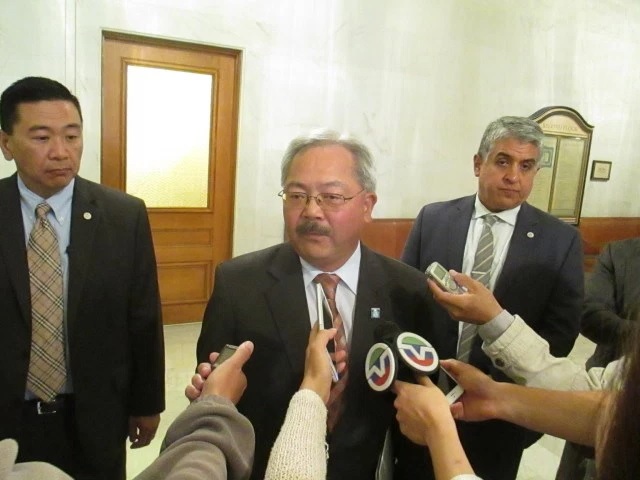
JANUARY 6, 2015 — Mayor Ed Lee is telling all city departments to cut their budgets by three percent over the next two years, saying that the city needs to address a $100 million deficit.
The Ex reported on this today; you can get the mayor’s budget message to departments here.
When the current budget is $8.9 billion, that deficit is about 1.1 percent, a fairly small amount – and although the General Fund part of the budget, which has to absorb all of the cuts, is only about half of that, the deficit is still a fairly small amount.
But here’s what’s interesting: The city can’t balance its books – even at a time when the local economy is undergoing the greatest boom in at least half a century. The mayor is proud of his “jobs agenda,” of all the new companies coming into town, of all the new construction going on … and all of that ought to be shoveling tax money into the city coffers.
Instead, he is calling for cuts, and asking departments to find new ways to raise revenue through fees, fines, and charging for services. Which tends to hit the poor the hardest.
So why are we running a deficit?
To hear the mayor’s description of the problem, it’s mostly about labor.
From his office:
Several factors contributed to the projected shortfall, but the top three were lower than expected returns in pension system for FY 2014-15, updated mortality assumptions meaning employees living longer and collecting pensions longer, and the loss of a legal challenge to a portion of Prop C related to supplemental COLA payments.
Why are these the only line items singled out as the cause of the deficit?
How about the Twitter tax break? How much is that costing the city? How about the money we’ve lost by allowing illegal office conversions?
Kimberly Alvarenga, a candidate for supervisor from D11 who is political director for SEIU Local 1021, which represents many city employees, told me:
To suggest that we balance the budget by instructing city departments to `increase fees, fines and charges for services’ shows complete disregard for working families that are already paying their fair share. The news today that our city is in a $100 million budget deficit is proof that the 1 percent are clearly off the hook in San Francisco.”
Sup. John Avalos, who served on the Budget Committee for many years, told me that he had opposed the tax breaks because it didn’t seem that the corporations were paying their way.
That’s the bigger issue here, I think: These numbers suggest that maybe all of this growth we’re seeing isn’t paying for itself – that all these new buildings actually cost us more than they bring in.
Think about it: We know that new buildings are only paying a tiny fraction of what they cost the city in Muni service. The city is subsidizing them to the tune of billions of dollars. The more new buildings we allow, the more Muni runs in the red. So with all the office space and luxury housing coming on line, the city must be losing millions over the next two years. That’s not in the mayor’s budget message.
We know that new construction doesn’t pay its fair share for affordable housing needs, and that means either the housing isn’t built or the taxpayers have to fund more of it.
Why doesn’t the mayor talk about any of that?
No: It’s much easier to play the game that Republicans love to play, and blame the workers.
We have heard this so many times before – pensions are bankrupting us, pensions are destroying state and local budgets, public employees are way overpaid, and on and on and on.
Robert Reich has a good explanation of what’s wrong with that argument. I would add, at the local level, this:
If you keep driving up the cost of living by attracting tech companies, who don’t pay their fair share of taxes, you need to pay employees more to keep up. Private businesses can close their doors or leave the city. Local government doesn’t have that option.
So the taxpayers (those of us who don’t get tax breaks) have to fork over more and more money to make it possible for the people who work for us, and keep us safe and fix our streets and drive our buses and run our hospitals and make sure the water is clean and all those other jobs can afford to pay the rent and retire with some dignity.
Oh, and since more people are getting evicted (and in some cases becoming homeless), and he social service needs of a city that has among the worst wealth gaps in the nation are (almost by definition) growing, we need more people working for the city.
I will go back to the case I’ve made in the past: For most people in San Francisco, certainly the middle and working-class, life is typically worse during the boom years.
That’s the hidden message in the mayor’s budget cuts.
Full disclosure: I am proud to do some freelance work for SEIU Local 1021, editing the union’s quarterly magazine. I have no role in union policy. I also teach at USF and am I guest lecturer at City College. In the unlikely event anyone else offers me paid work, I will be sure to let you know.
Like this article? Please support 48 Hills for more.






